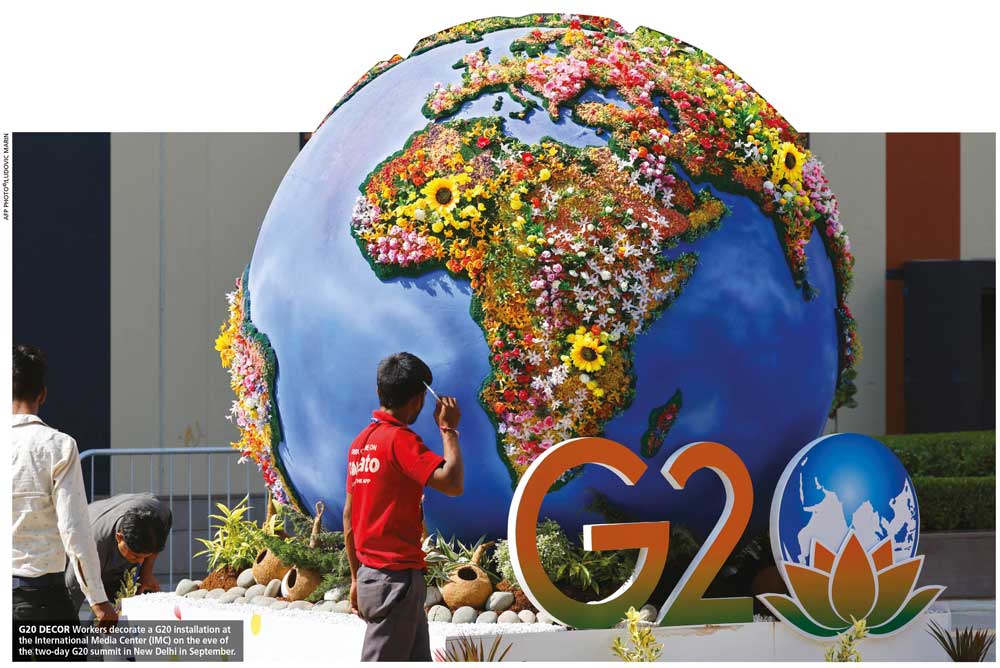DIPLOMATIC FEATS ENGULF G20 ASSEMBLY
Saro Thiruppathy weighs in on the salient points of the New Delhi Declaration coming out amid the diplomatic feats at the G20 summit in India
They say good things come in threes – and this has been the case for India and Prime Minister Narendra Modi over the past few months.
It began in June when Modi visited the US, and received a ceremonial welcome and star treatment in Washington.
Then came the successful BRICS summit in August in which India is a key player. During the gathering, the Indian Space Research Organisation (ISRO) landed Chandrayan-3 on the south pole of the moon to much applause.
And in September, India pulled out all the stops to host the glamorous G20 summit in New Delhi.
All these events have shone the international spotlight on the subcontinent’s achievements and ambitions.
G20 SUMMIT New Delhi hosted the 18th G20 summit on 9 and 10 September. While the event was a flamboyant affair, an important aspect was the inclusion of the African Union (AU) in this exclusive group of nations that has the largest economies, and include both industrialised and developing countries.
This group of nations accounts for about 80 percent of gross world product (GWP), 75 percent of international trade and 60 percent of the land area on the planet; and it is home to two-thirds of the global population.
The original list of member countries before the inclusion of the African Union included Argentina, Australia, Brazil, Canada, China, France, Germany, India, Indonesia, Italy, Japan, South Korea, Mexico, Russia, Saudi Arabia, South Africa, Türkiye, the UK, the US and the EU. India hosted the G20 summit for the first time this year after having gained the presidency from Indonesian President Joko Widodo. In turn, Modi handed over the presidency of the 2024 summit to Brazil’s President Lula da Silva.
With the exception of Russian President Vladimir Putin and Chinese President Xi Jinping, the rest of the heads of state turned up as invited. China was represented by Prime Minister Li Qiang and Russia’s Foreign Minister Sergey Lavrov represented Putin at the summit.
New Delhi’s theme this year was ‘One Earth, One Family, One Future’ (‘Vasudhaiva Kutumbakam’ in Sanskrit) and the goal is sustainable development.
THE DECLARATION In spite of pressure from the US and EU to include a strong statement against the Russian invasion of Ukraine in the New Delhi Declaration, India’s loyalty to its longtime friend and ally Russia prevailed.
Though the document didn’t mention the Russian invasion of Ukraine, it called on all states to respect each other’s territorial integrity and sovereignty. India’s strength was evident in this decision.
The statement focussed on achieving the UN Sustainable Development Goals (SDGs), green development initiatives to promote climate health, multilateral financing, international taxation, digital public infrastructure, AI and so on.
Modi also called for reforming global institutions such as the UN Security Council so that it would be more in line with rapidly changing global dynamics.
Another diplomatic feat was gaining unanimous approval (including a nod from the two absentees – Putin and Xi) for all 83 paragraphs of the G20 New Delhi Leaders’ Declaration. And the declaration did not contain footnotes or a summary by the Chair.
The document also contained multiple agreements in relation to finance and eight paragraphs on the conflict in Ukraine in the context of the subsequent economic implications.
With regard to climate change, the declaration noted that approximately US$ 5.9 trillion is urgently required for developing nations in the lead up to 2030, and another four trillion dollars is needed each year to enable the development of clean energy technologies by 2030, if the goal of attaining net zero emissions by 2050 is to be reached.
Even though the members could not agree on phasing out fossil fuels, they did endorse a goal to triple global renewable energy capacity.
The governments of India, the US, Saudi Arabia, the EU, the UAE and others signed a memorandum of understanding to establish the India-Middle East-Europe Economic Corridor (IMEEC), to promote economic development through integration between Asia, Europe and the Arabian Gulf.
This initiative will comprise a network of transport routes that includes railways and sea lanes.
NEW MEMBERS Previously, only South Africa was a member of the G20. But in New Delhi, the Chair formally invited the African Union – which was represented by Chairperson Azali Assoumani – to accept full membership of the G20 and take a seat at the table.
The AU, which comprises 55 countries in Africa, is now a member – much like how the EU is represented in the G20.
India is aiming for a permanent seat in the United Nations Security Council and Africa’s 55 votes are crucial to attain this goal. Bangladesh, Nigeria, Egypt and Mauritius were also invited to attend the G20 summit as guests.
On the sidelines of the summit, several G20 leaders visited the memorial to Mahatma Gandhi at Rajghat to pay their respects to the ‘Father of the Nation.’
This content is available for subscribers only.







